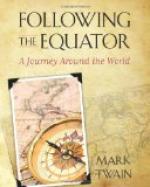About 64 roads to the other world. You see how healthy the religious atmosphere is. Anything can live in it. Agnostics, Atheists, Freethinkers, Infidels, Mormons, Pagans, Indefinites they are all there. And all the big sects of the world can do more than merely live in it: they can spread, flourish, prosper. All except the Spiritualists and the Theosophists. That is the most curious feature of this curious table. What is the matter with the specter? Why do they puff him away? He is a welcome toy everywhere else in the world.
CHAPTER XIX.
Pity is for the living, Envy is for the dead.
—Pudd’nhead
Wilson’s New Calendar.
The successor of the sheet-iron hamlet of the mangrove marshes has that other Australian specialty, the Botanical Gardens. We cannot have these paradises. The best we could do would be to cover a vast acreage under glass and apply steam heat. But it would be inadequate, the lacks would still be so great: the confined sense, the sense of suffocation, the atmospheric dimness, the sweaty heat—these would all be there, in place of the Australian openness to the sky, the sunshine and the breeze. Whatever will grow under glass with us will flourish rampantly out of doors in Australia.—[The greatest heat in Victoria, that there is an authoritative record of, was at Sandhurst, in January, 1862. The thermometer then registered 117 degrees in the shade. In January, 1880, the heat at Adelaide, South Australia, was 172 degrees in the sun.]
When the white man came the continent was nearly as poor, in variety of vegetation, as the desert of Sahara; now it has everything that grows on the earth. In fact, not Australia only, but all Australasia has levied tribute upon the flora of the rest of the world; and wherever one goes the results appear, in gardens private and public, in the woodsy walls of the highways, and in even the forests. If you see a curious or beautiful tree or bush or flower, and ask about it, the people, answering, usually name a foreign country as the place of its origin—India, Africa, Japan, China, England, America, Java, Sumatra, New Guinea, Polynesia, and so on.
In the Zoological Gardens of Adelaide I saw the only laughing jackass that ever showed any disposition to be courteous to me. This one opened his head wide and laughed like a demon; or like a maniac who was consumed with humorous scorn over a cheap and degraded pun. It was a very human laugh. If he had been out of sight I could have believed that the laughter came from a man. It is an odd-looking bird, with a head and beak that are much too large for its body. In time man will exterminate the rest of the wild creatures of Australia, but this one will probably survive, for man is his friend and lets him alone. Man always has a good reason for his charities towards wild things, human or animal when he has any. In this case the bird is spared because he kills snakes. If L. J. he will not kill all of them.




